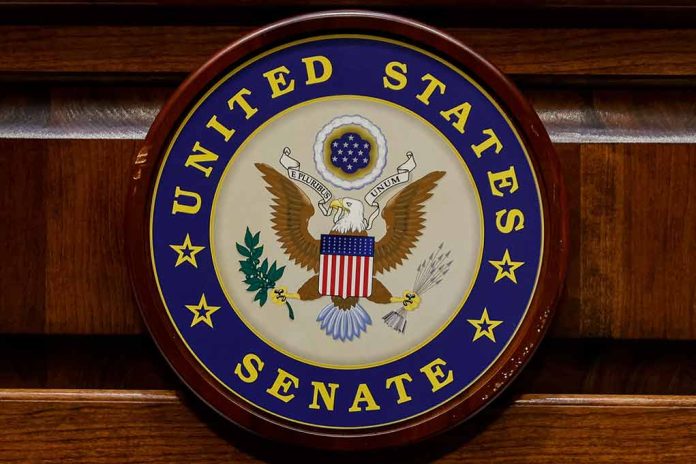
The Senate’s recent vote to overturn Trump tariffs on Canadian goods raises concerns over economic impacts and future legislative success.
Key Takeaways
- The Senate passed S.J. Res. 37 to overturn tariffs on Canadian goods, backed by bipartisan support.
- The legislation challenges the 1977 IEEPA used by Trump to enforce tariffs.
- Trump imposed tariffs citing national emergencies related to fentanyl and immigration.
- The resolution’s legislative prospects in the House remain bleak, as Trump continues to endorse tariffs.
Senate Vote Details
The Senate voted 51-48 in favor of S.J. Res. 37, introduced by Sen. Tim Kaine, marking an attempt to repeal President Trump’s tariffs on Canadian imports. The resolution received support from four Republicans alongside all Democrats, acting as a symbolic challenge to Trump’s trade policies. The legislation aims to dismantle the 1977 International Emergency Economic Powers Act (IEEPA) under which the previous administration justified tariffs on several countries, including Canada.
This legislative move comes despite Trump’s arguments that these tariffs are necessary to address threats such as the flow of fentanyl and immigration concerns. Trump believes that Canada was not doing enough to curb these issues. However, critics within the Senate underline that tariffs will ultimately increase costs for American families and threaten job security in a trade relationship critical for both nations.
Four Senate Republicans broke ranks, voting with Democrats late Wednesday to overturn President Donald Trump’s emergency tariffs on most Canada goods. But Sen. John Barrasso said the vote is "meaningless" because the measure won't get through the House.https://t.co/RMjoRkaclW
— Cowboy State Daily (@daily_cowboy) April 3, 2025
Economic Impact Concerns
The economic implications of these tariffs are significant, with some senators, including Rand Paul and Susan Collins, voicing concerns over their adverse effects on state economies and various industry sectors. Trump’s administration, however, argues for the necessity of these tariffs, which are seen as tools to generate revenue and promote the re-shoring of manufacturing. As Sen. Jim Justice remarked, “What we are is just an assembler of a bunch of expensive parts from all kinds of other countries, and that is not any good.”
The pause on Canadian tariffs, announced by Trump but expiring after 30 days, complicates efforts for re-shoring production. Furthermore, Senate Democrats warn that the tariffs, far from serving national interests, equate to a national sales tax affecting American households. Senate Majority Leader Mitch McConnell argued, “As I have always warned, tariffs are bad policy, and trade wars with our partners hurt working people most.”
Future Legislative Prospects
While the Senate’s resolution signifies a shift in opposition to certain Trump administration policies, its future in the Republican-controlled House remains uncertain. Trump continues to advocate for his tariff policy, criticizing the Republicans who backed the resolution. “They are playing with the lives of the American people, and right into the hands of the Radical Left Democrats and Drug Cartels,” Trump asserted through social media. Democrats plan to maintain pressure, with Rep. Gregory Meeks preparing for a similar vote in the House despite the low likelihood of success.
The Senate’s action highlights a growing divide within Republican circles concerning Trump’s economic strategies. Some senators see the tariffs as detrimental, whereas others believe the administration’s focus on reshoring and national economic growth justifies temporary discomforts. As discussions unfold, the resolution’s symbolism reflects broader political and economic debates crucial to U.S.-Canada trade relations.
Sources
1. Senate Approves Resolution to Nullify Trump’s Tariffs on Canada
2. Senate rebukes Trump’s tariffs as some Republicans vote to halt taxes on Canadian imports




